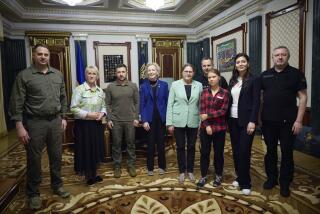Environmentalists Finally Find an Ear : Russia: Expert says Yeltsin is not only listening, he’s acting.
- Share via
MOSCOW — After years of bumping his head against the wall trying to get top government officials to pay attention to him, Russia’s foremost environmentalist said Wednesday that, finally, someone’s listening.
Alexei V. Yablokov, Russian President Boris N. Yeltsin’s top adviser on environmental policy, said at his press conference that unlike previous leaders, Yeltsin and his first deputy prime minister, Gennady E. Burbulis, have not only started listening to environmental activists but they have also started to act.
“At last,” he said, “there is someone who listens. There is a possibility of accomplishment. If you can get the ear of Yeltsin or Burbulis, things get done. This is encouraging.”
Yablokov has lots of experience trying to fix what he describes as a “perfect disaster”--his country’s environmental situation. Before perestroika, he struggled outside of official channels. But in 1989, when the first Congress of People’s Deputies convened, Yablokov quickly emerged as the leader of the environmental lobby. He was named deputy chairman of the Soviet legislature’s environmental protection committee and director of the Soviet campaign for Greenpeace, the international environmental movement.
In his press conference, he praised Yeltsin’s decision to allocate 5 billion rubles in 1992 for environmental concerns, despite the country’s economic chaos. Under Yeltsin, the first two national parks were established in Russia.
Giving an example of the new regime’s attitude toward the environment, Yablokov referred to Yeltsin’s five-hour session Tuesday with representatives of the huge nuclear industry conglomerate. They wanted Yeltsin to preserve their monopoly on designing, developing and testing nuclear arms. But they did not want to take responsibility for destroying or disposing of them, Yablokov said.
“We supplied the president with the relevant information, and this helped him to resist their push,” Yablokov said triumphantly. “The fight is still on and we are planning our next steps.” Yablokov called the results of the meeting a “half-victory for the ecological lobby.”
Based on the new official attitude, Yablokov said he has brightened his forecast for Russia’s environment. He predicted that, in as little as eight years, Russia could see an improvement in its environment. But this depends on its speedily adopting the Western practice of forcing polluters to pay the full cost of cleanups, he added. Until now, polluters in Russia have only had to pay small fines.
Russia is paying dearly for the environmental crimes of previous regimes, he said. That its people have a declining life expectancy is directly attributable to heavy environmental pollution, Yablokov asserted. Life expectancy in Russia, after peaking in 1986 at 70.1 years, has been steadily shrinking and at the end of 1990 stood at 69.3 years. That compares to the figure of 75.3 years in the United States and 77.3 years for Japan.
There are cities in Russia where the population does not make it to the average retirement age of 60 for men and 55 for women, Yablokov noted.
He said “the monster of pollution” in Russia takes many forms, the most fierce and dangerous being radioactive pollution. The massive cleanup campaign after the 1986 disaster at the Chernobyl nuclear power station continues, Yablokov said.
But the philosophy is now changing. Instead of moving people out of regions where there are small areas of contamination, the government has now started cleaning up the “dirty spots.”
Another component of Russia’s radioactive pollution is non-military nuclear blasts, of which there have been 126, Yablokov said. Such blasts were used to excavate trenches, create underground storage facilities for dangerous wastes among other purposes.
Grebenshikov is a reporter in The Times’ Moscow bureau.
More to Read
Sign up for Essential California
The most important California stories and recommendations in your inbox every morning.
You may occasionally receive promotional content from the Los Angeles Times.










